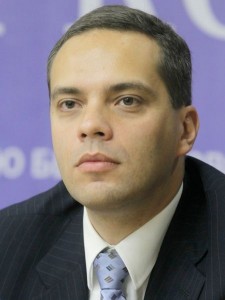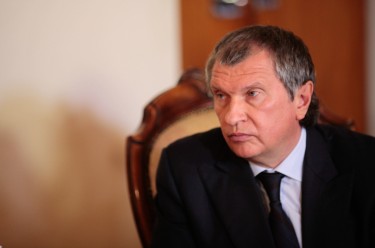One of the staples of Russian political rhetoric over the last decade has been the bogeyman of the immediate post-Soviet era. “The Turbulent Nineties,” as they're known today, represent everything that was wrong with Russia's fall from grace: gangsters, corruption, poverty, and so much more. Another prominent feature of the 1990s was intense rivalry between the nation's most powerful substate groups (variably called “clans” or “mafias”). Perhaps nothing embodied this chaos better than the competition between Russia's biggest business tycoons—the oligarchs—who battled one another, armed with incredible access to both the state apparatus and the country's mass media.
Putin supposedly put an end to all that, locking up or booting out the most contumacious oligarchs (like Khodorkovsky, Berezovsky, Guisinsky, and others), and acclimating the rest of the elite to a new social contract, where the state would repossess the economy's “commanding heights.” Putin's Russia would become a more predictable and peaceful place, and society's uppermost echelon—the story goes—could finally rest easy.
Why then do Russian elites seem to be suffering so many sleepless nights in Putin's third term? Talking points in the last few months—thanks largely to the Kremlin's own highly publicized anti-corruption campaign—have orbited issues that were supposed to have disappeared at the turn of the century. The buzz [ru] around Moscow is that Putin is busy establishing a new foundational pact to unite (and subdue) the nation's elite. To a certain extent, this includes personnel changes (some routine, others more dramatic), but there is also a growing perception [ru] that access to power [ru] (and the wealth that accompanies it) is now available on terms quite different [ru] from what justified such privileges [ru] ten years ago. (Loyalty alone, it seems [ru], is no longer enough to guarantee immunity.)
The state of elite affairs is a matter of interest to all groups involved in politics and society—including the RuNet's indomitable foot soldiers, the members of the opposition. This is a point that opposition politician Vladimir Milov has pressed for years, most recently in connection with intra-elite fighting that is currently raging [ru] between Putin's top subordinates, Igor Sechin (long-time hydrocarbons czar) and Arkady Dvorkovich (Prime Minister Dmitri Medvedev's own man in oil and gas).
In late February, Milov, who leads a small liberal political party called “Democratic Choice” (DemVybor), authored an op-ed [ru] for the e-zine Slon.ru (with supplemental material [ru] on DemVybor's LiveJournal page), where he argued that Sechin had suffered a major defeat in a government decision to inject 50 billion rubles into the capital assets of RusHydro, Russia's biggest hydroelectric entity, at the expense of state company Rosneftegaz, which Sechin heads. (Sechin lobbied in vain [ru] to execute the capital injection by way of Rosneftegaz purchasing stock in RusHydro, which would have expanded his influence over the hydroelectric industry.) Dvorkovich scored a major coup [ru] by converting to his side longtime Sechin-ally Evgeny Dod (RusHydro's chief) in a December 2012 vote, when the company's board of directors narrowly approved the government's capital assets scheme (which already carried Putin's signature [ru]).
In the article, Milov levies the particularly scathing accusation that Rosneftegaz itself represents a scheme more underhanded than the infamous “loans for shares” of the Yeltsin era (which epitomized the worst oligarchic corruption of the 1990s). Indeed, Rosneftegaz was created in 2004 as a stopgap to facilitate Gazprom's takeover of Rosneft, with the expectation that it would be liquidated afterwards. When that deal collapsed, Rosneftegaz was left—very much intact—holding 10% of Gazprom and 100% (later reduced to 75%) of Rosneft. Milov highlights the fact that Rosneftegaz's multi-billion-dollar dividends do not revert to the state budget. Instead, the company is allowed to reinvest its profits on its own. (Unless, of course, it's forced to transfer 50 billion rubles to federal coffers for a handout to RusHydro, à la Dvorkovich's plan.)
Milov also highlights a story [ru] in Vedomosti from February 19 about the absence of a formal shareholder agreement between Rosneftegaz and the Federal Agency for State Property Management (Rosimushchestvo). This means that both the Ministry of Economic Development and even Prime Minister Medvedev lack the formal power to enforce directives issued to Rosneftegaz. Only the Presidential Administration can change its leadership and board of directors, effectively making Rosneftegaz an independent agency, in lieu of Putin's personal intervention.
Such intervention, Milov notes, grows more costly, as rising stakes make every dismissal a potential catalyst for “elite split”:
Отправишь кого-то в отставку – а он станет центром консолидации недовольной части истеблишмента.
Fire somebody, and he'll become the center for the consolidation of the malcontents of the establishment.
Milov picked an odd time [ru] to tout Sechin's weakness. The RusHydro showdown was over two months ago. Since then, two of Dvorkovich's allies [ru] have come under direct fire [ru] from Putin himself in the classic routine [ru] of faux-impromptu public criticism followed by official dismissal. The first victim was Akhmed Bilalov, whose alleged mismanagement of construction for the Sochi Winter Olympics cost him his job. Later in the month, national television network Rossiia-1 aired a rather vicious report [ru] accusing Dvorkovich and Bilalov of involvement in a shady privatization plot [ru]. (Dozhd TV, which is rumored [ru] to have ties to Medvedev through his Press Secretary Natalia Timakova, then aired a segment [ru] claiming that the Rossiia-1 program was orchestrated by Sechin.)
Also in February, Putin delivered a tongue-lashing [ru] to none other than Evegny Dod, Sechin's erstwhile ally at RusHydro. Dod's sins [ru] included misplacing up to 12 billion rubles earmarked for a power station outside Moscow. Rumor [ru] now has it that ex-MP Vladimir Pekhtin, recently disgraced by muckraking bloggers in a real estate scandal, could replace Dod at RusHydro, if he resigns as expected.
News of Pekhtin's possible return prompted Milov to tweet [ru] on February 27:
Когда вам в след раз будут снова подсовывать сечинские сливы под видом “борьбы с жуликами”, think twice
The next time you [want] to pass off another Sechin-news-leak as part of the “battle against corruption,” think twice.
This was clearly a shot at Alexey Navalny, the anti-corruption netizen who ended Pekhtin's Duma career by disseminating the findings of anonymous blogger Dr. Z, who discovered the deputy's suspicious real estate holdings in Miami, Florida. When Twitter user arctic_lane challenged Milov's attitude, he responded that it was naiveté to ignore the fissures in the government that produce such compromising information leaks, implying that Pekhtin's situation was the result of a war among elites:
я хочу лишь предупредить наивных о'вечек, чтобы они аккуратнее относились к публикациям одного известного волчары
я предлагаю атаковать прежде всего главных воров. Сечина, например. кстати, наивный вопрос – Навальный хоть раз его атаковал?
i want only to warn naive people, so they better understand the publications of one of the most famous SOBs
for starters, i propose attacking the main thieves. Sechin, for example. by the way, a naive question: has Navalny ever attacked him even once?
Milov's question is an interesting one. Indeed, for all his exposés and scathing revelations, Navalny has never devoted his anti-corruption machine to a serious assault on Igor Sechin. Yes, in June last year, Navalny did via Twitter [ru] call Sechin a “dumbass” (дебил) after the latter accused him of serving the “private interests” of Rosneft's competitors. But that's kids’ stuff. Milov is right. Navalny hasn't made Sechin a priority, at all. Why not?
One clue about Navalny's reluctance to pick up a weapon in the “clan war” might be a tweet [ru] from April 18, 2012, when he shared an “excellent article” by Stanislav Belkovsky, titled “Perestroika 2: Between Liberals and the Bloody KGB.” In that piece, published [ru] on the now defunct portal OpenSpace.ru (but still available here [ru]), Belkovsky rejects the notion that Russian politics consists of a conflict between liberals and hardliners:
[…] мы должны как-то понять и запомнить, что ли: не существует никакой идейной борьбы между виртуальными партиями Медведева и Сечина. Есть аппаратная борьба кланов, да. И связанных с ними бизнес-групп. Но кланы и группы эти — части одной машины, всходы одного посева. И успех одного из кланов — локальный или даже по всем фронтам — самостоятельного политического значения не имеет.
[…] we need somehow to understand and remember something: there's no such thing as an ideological battle between the virtual parties of Medvedev and Sechin. There is a battle of clans within the state-apparatus, yes. And related to that, of business groups. But these clans and groups are pieces of the same machine—sprouts from the same seed. And the success of one clan—in one place or even across the entire front—has no independent political significance.
In comments [ru] not on his blog, but delivered to newspaper Moskovskii Komsomolets, Navalny recently addressed the Bilalov scandal without mentioning either Sechin or Dvorkovich. Instead, he made an errant remark about Dagestani businessmen (Bilalov is from Dagestan) and issued the standard barrage of anti-Putin condemnations.
If this is indeed how Navalny views “high Kremlin politics,” it serves to reason that he's reluctant to take sides. Evidence of such misgivings does exist. In an article [ru] for Slon.ru in April 2011, this was certainly the vibe Navalny projected, when he cautiously welcomed Sechin's ouster from the Rosneft board of directors. “So we'll see what happens from here,” he wrote at the time.
Navalny's misgivings were well founded. By November 2012, Sechin, now President of Rosneft, was reelected [ru] to the company's board.









